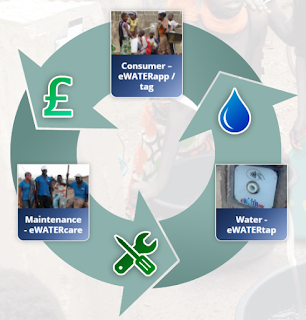My final post
In my final blog I will be looking at the women run water centers in Nigeria, this program helps women gain independence and an income
whist supplying their families and village with safe drinking water. This scheme
has been created in response to the UN’s (United Nation) Sustainable Development
Goal of clean water and sanitation for all. These water centers are known as Sunlight
Water Centers, they have been formed by a TechnoServe and Unilever partnership
to bring affordable and safe water to the Nigerian rural public. Women have
been the key focus of this scheme, as they choose, hire and train women to run
the local water centers. This encourages the women to be local entrepreneurs
and work as they have spare time since they no longer have to travel vast
distances to collect water.
The program has an acceptance process as the women have to
be nominated, often by the head of their village, and then they undergo an
interview process. This is all worth it as they receive training in record
keeping and financial management schemes. This support is very important as
many women feel alone when starting up a new business, this training and support
will give the women the encouragement and confidence they need to succeed. Alongside selling water the women are
encouraged to sell other products, such as toiletries and food; these will
increase the profits and give the women’s business as boost. Although only a
handful of women are actually running the centers the other women of the
village gain from this scheme, as they are no longer spending long amounts of time collecting water, they
can gain employment or education with this new time they have. TechnoServe and
Unilever aim to open up 1,000 more water centers which will bring safe water to
500,000 more people. This will be 1,000 more women running their own businesses
from this program and many others benefiting from this.
A woman called Charity Dangana is among the chosen women to
run their own water centers, she has expressed the development in her social
status in her village. As people now regard her as an entrepreneur they have
more respect and admiration for her, this will encourage other girls and women
to further their education or careers.
Unilever works with other NGO’s (Non Governmental Organisations), including Oxfam and
WaterAid to supply the rest of the world with water. They understand the
importance of the relationship between women and water and how it needs to be
changed for the better.
Whilst conducting research over the weeks for my blogs my
eyes have been open to the numerous problems that women face with water and the
many people and organisations trying to help bridge the gap of gender
inequality in regards to water. It was especially eye opening to see the
problems regarding toilets and sanitation that women have to face, something
that I have taken for granted my whole life has been a lifelong problem for
many women not only in Africa but in other parts of the world. Not being able
to finish school or go to work simply because of the toilet and sanitation
issues is what is holding many girls and women back, making them financially dependent
on the males in their family. However, even when women do work they often have
gendered problems regarding water. As female farmers have been victim to receiving
irrigable plots that is often half the size of men’s plots. Men also have
better success to groundwater irrigation, leaving the women to use other means
of irrigation which are often not as sustainable and accessible. This
inequality has been seen and some are doing something to eradicate the inequality,
in Nyandusi in Kenya, women are given priority allocation of land. With the
help of modern technology and social media these inequalities are being seen on
a global scale and are drawing global support. This often comes from things
such as World Toilet Day which was created by the UN to raise awareness of
sanitation. The use of modern technology in water supply is also pivotal in the
lives of women. This is seen in eWATER, where they use new technology, such as
the cloud and contactless scanners in order to supply villages with clean,
accessible and affordable water supply, while maintaining the water source.
References:
(2016). WOMEN-OWNED BUSINESSES PROVIDE CLEAN WATER IN NIGERIA. Available:
http://www.technoserve.org/blog/women-owned-businesses-provide-clean-water-in-nigeria.
Last accessed 31st Dec 2017.
Povel S. A.
M. T. (1990). “Participatory development of a Women’s Irrigation Scheme case:
The Nyandusi Women Horticultural Scheme Nyanza Province, Kenya,” Contribution
to the International Workshop “Design for Sustainable Farmer Managed Irrigation
Schemes in Sub-Saharan Africa” Department of Irrigation and Soil and Water
Conservation Wageningen Agricultural University
Smart solutions for a water-scarce future. Available:
https://www.unilever.com/sustainable-living/reducing-environmental-impact/water-use/smart-solutions-for-a-water-scarce-future/.
Last accessed 31st Dec 2017.

This comment has been removed by the author.
ReplyDeleteHi Amandeep,
ReplyDeleteWhat a great way to round off your blog- I really like seeing how much you've learned about some of the less visible nuances of gender and water (e.g. the fact that just because a women is given employment, doesn't mean she's being given equal opportunities as her male counterparts).
I was interested in the election process that gets the women to become managers for the centres. Do they volunteer to stand for nomination, or does the village head pick any woman? Perhaps this is too generalising, but I would also assume that most of these village heads are men. Is there not some degree of an embedded opportunity for inequality therefore- e.g. a village head might pick his wife, or a more acquiescent woman who is more likely to let a man make decisions for her?
Despite my nitpicking, however, it does sound like a great scheme!